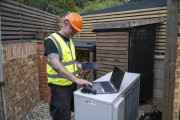A recent article in the Vancouver Sun raised questions about the costs and merits of a city-run pilot program to encourage homeowners to invest in energy efficiency, describing the program as having “bombed.”
The program did have much lower uptake than expected; however, judging its success on this factor alone misses the bigger picture. Given the limited leadership from provincial and federal governments on reducing greenhouse gas pollution, we need to support and encourage the innovative and creative solutions being tested in local communities. This is not to say that every new program will succeed (or should be implemented on a broader scale), but that local governments need to be given the space to try.
Innovation at the community level is one of the bright spots on the landscape of climate action in Canada, and it has the potential to contribute meaningfully to reducing Canada’s greenhouse gas emissions. The lack of leadership from the federal government on climate action has made actions taken at the municipal and provincial level all the more important. So while Vancouver’s pilot program may not have been a resounding success, it’s important to support creative thinking and the calculated risk-taking behind such initiatives, and to build on the lessons that can be learned from its shortcomings to improve the design of such programs in the future.
As someone who works in local communities across the province, I know that finding ways to increase the rate at which we upgrade our existing homes and buildings is one of the toughest community-level energy challenges we face. Municipalities have limited tools within their arsenal to implement solutions, and many communities, including Vancouver, are testing the limits of their power and jurisdiction to try and find new and innovative ways to reduce greenhouse gas pollution. Financing programs, like Vancouver’s HELP program, that give homeowners access to capital explicitly to improve the energy efficiency of their homes is one example of a strategy that has been employed with success in a number of other jurisdictions, including: Berkeley, California; Portland, Oregon; and Nelson, B.C.
Why Vancouver’s program is underperforming is a question that needs to be addressed. Relatively higher interest rates may be to blame, or perhaps it is the high costs of real estate in Vancouver. Hopefully there will be lessons to help adapt the program or help others design similar programs.
But without cities like Vancouver being willing to try new ideas, we take away one of most powerful opportunities for bold climate action across Canada. As Thomas Edison said, “I have not failed. I’ve just found 10,000 ways that won’t work.” We look forward to Vancouver’s next initiative.








